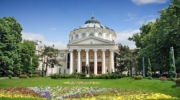Germany: EU Prize for Cultural Heritage / Europa Nostra Award presented to the Rundling Association
The Rundling Association, a Grand Prix winner of the EU Prize for Cultural Heritage / Europa Nostra Award 2015, considered Europe’s highest honour in the field, was recognised for its 46 years of dedicated voluntary service to the preservation of unique medieval villages during a ceremony held in Luebeln on Saturday 12 September 2015, which coincided with the annual Rundling Villages Day. The celebration continued on Sunday in Schreyahn, with a rich programme marking the official opening of Lower Saxony Monuments Day. Representatives from Europa Nostra, Europa Nostra Germany, local, regional and national Governments, and public and private bodies participated in the events, which gathered around 220 people over the weekend.

‘Rundling’ is the name given to the circular villages of Slavic origin dating from the 12th century. These settlements were originally common in many areas of Central Germany, but are now confined to some 95 examples in the Wendland area, in rural Lower Saxony. Since 1969, the Rundling Association has worked tirelessly to save these distinctive pieces of heritage. The Awards’ Jury was deeply impressed by the commitment and strategic vision of successive generations of volunteers who have helped revitalise the Rundling as thriving communities and by their efforts to lift them to World Heritage Status.
The Rundling Association was declared a Grand Prix laureate and received €10,000 at the European Heritage Awards Ceremony in Oslo on 11 June 2015. This Saturday’s special event at the Rundling open-air museum in Luebeln marked the arrival of the prize in Germany.
Europa Nostra’s Vice-President Prince Alexander zu Sayn-Wittgensteinpresented the award to the chairperson of the Association Ilka Burkhardt-Liebig. The bronze trophy was symbolically passed through the hands of all the still living Presidents of the Association to mark the almost five decades of continuous voluntary work towards the preservation of these medieval villages.
In his speech, Alexander zu Sayn-Wittgenstein praised the Rundling Association for its remarkable heritage achievement. The Vice-President of Europa Nostra, who is also the President of Europa Nostra Germany, described the great diversity of Europe’s cultural heritage as a strong contributor to forming a feeling of identity within our continent. He also stated that “we should see in the forced population migrations to Europe the potential of further cultural enrichment” and noted that “according to the Christian tradition, we should welcome these people with open arms”.
Ilka Burkhardt-Liebig outlined how successive generations of volunteers have used their influence both upwards and downwards, in the political sphere and at the individual level of the householders whose hopes and wishes are key for the preservation of the old farmsteads. “Only with this twin approach can meaningful protection of cultural heritage take place,” stressed the chairperson of the Rundling Association.
Jürgen Schulz, Head of the District Council of Lüchow-Dannenberg, welcomed the 120 attendees, including 60 members of the Rundling Association. The introductory remarks were made by Prof. Dr. Stefan Winghart, President of the Lower Saxony Office for the Protection of Ancient Monuments, and Peter Thran, ECOVAST, Germany. Prof. Dr. Wolfgang Meibeyer delivered the keynote speech on ‘Rundling villages in Wendland and their Hall-houses: a unique synthesis in Central Europe’ and advocated their inscription on UNESCO’s World Heritage List.
The festive day was enriched by traditional dances from ‘De Öwerpetters’ and ‘De Wendländer’, a presentation of works on the theme of Rundling villages by students at the Lüchow Grammar School, and demonstrations of local crafts.
The celebration continued on Sunday in the Rundling village of Schreyahn with the official opening of the annual Lower Saxony Monuments Day, which was hosted by Dr. Gabriele Heinen-Kljajic, Minister for Science and Culture in the Lower Saxony Parliament. After the Minister’s address, Europa Nostra’s Vice-President Piet Jaspaert took the floor. He highlighted the importance of the EU Prize for Cultural Heritage / Europa Nostra Award given to the Rundling Association and reiterated the Award’s Jury recommendation for inscribing the Rundling villages on UNESCO’s World Heritage List, “as they are truly unique settlements in Europe”.
Europa Nostra’s Vice-President Piet Jaspaert added: “In his special message for the 2015 winners, the President of Europa Nostra, Maestro Plácido Domingo, declared: ‘The time has come for Europe – both for the European Union and the Council of Europe – to develop hand in hand an ambitious strategy for Cultural Heritage, in close partnership with and the active participation of civil society. It is our shared goal to continue building the policy momentum for heritage in Europe.’ We all hope that 2018 will be the European Year of Cultural Heritage, following the initiative of Deutsches Nationalkomitee für Denkmalschutz”.
After the lunch hosted by the Schreyahn Rundling community, the 100 participants were given a guided tour of the village by Dr. Dirk Wübbenhorst. They then divided into two groups: one took part in a bus tour through 8 Rundling villages, while the other took the opportunity provided by 8 householders of protected buildings who opened their doors to the public.






